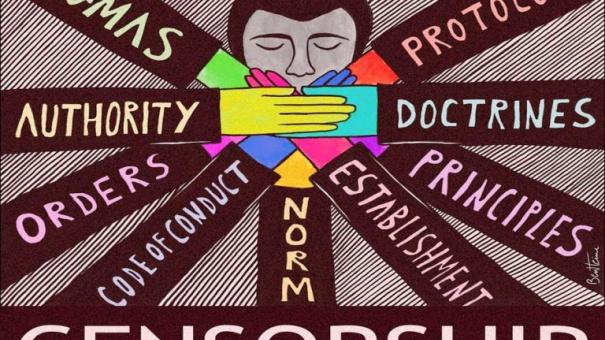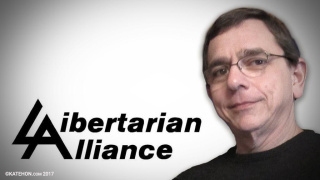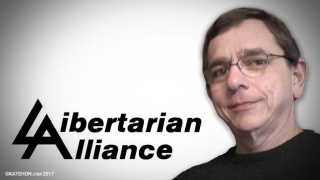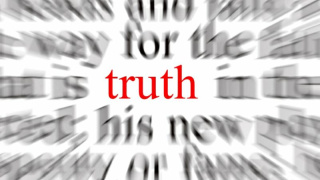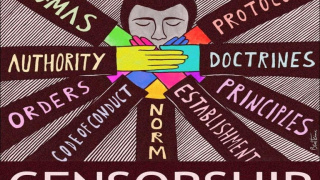State Censorship, Corporate Censorship: A Libertarian View
Every age we have so far known has been one of censorship. This is not to say that opinion has been equally constrained in all times and places. Sometimes, as in the Soviet Union, it has been oppressive and omnipresent – even extending to an imposition of orthodoxy on the natural sciences. More often, it has been focussed on perceived criticisms of the established political and religious order. Sometimes, dissent has been permitted among the intellectual classes – especially when expressed in a language unknown to the people at large, and only punished when communicated to the people at large. Sometimes, a diversity of political orders has limited any particular censorship to an area of just a few square hundreds of miles. Sometimes it has been limited by a general belief in the right of free expression. But I can think of no time or place where publication has been absolutely unconstrained.
If I look at modern England, I cannot say that censorship is as oppressive and omnipresent as it was in the Soviet Union. I cannot think of any opinion that cannot somehow be expressed. For the avoidance of doubt, I do not wish to do any of these things. However, if I want to deny the holocaust, I can. If I want to claim that the coloured races are intellectually or morally inferior, I can. If I want to say that homosexuality is a dreadful sin that will be punished by everlasting torments, I can. If I want to argue – in the abstract – for the rightness of shooting politicians, I can. The law in England punishes what are regarded as inflammatory expressions of such belief. It also punishes expressions of such belief when they are regarded as affecting known individuals. But I am not aware of a law that makes it a crime to publish sober and abstract expressions of any opinion.
This being said, the administration of the law, during the present century, has been stretched in England to the point where expressing disapproved opinions in everyday life has become dangerous. Statements that do not involve threats against known individuals are being prosecuted as if they were threats. There is also the fact of what is called social pricing. It may be legal to publish any of the above opinions. But anyone who does publish them will find it hard to secure employment in the state or corporate sector.
We do not have, in England, anything approaching a regular censorship. Even so, speech is less free than it used to be, and far less free than it ought to be. Let me, then, give a brief argument for greater freedom of speech than we enjoy. This covers both direct action by the authorities and action by their creatures.
I am a libertarian. I believe that people should, at the minimum, be free to say whatever they please about alleged matters of public fact – political, religious, scientific and historical. I am sceptical about the justice of the laws covering libel and confidentiality and copyright and official secrecy. But, so long as these are confined to achieving their traditionally stated ends, I will, for present purposes, leave them to one side. I will also leave aside pornography made by and for consenting adults. Though its publication is still to be defended on the grounds of what John Stuart Mill called “experiments of living,” visual pornography is not, by any reasonable definition, speech about alleged matters of public fact. But, as a libertarian, I see the right to speak freely on alleged matters of public fact as something to be defended without shuffling disclaimers, and without embarrassed silences.
So how is the right to freedom of speech to be defended? Of course, I would like to see a strong legal protection in this country. I would like something like the American First Amendment, which, as presently interpreted, blocks the formal censorship of anything that counts as speech about alleged matters of public fact. Our own legal protection is weak. The European Convention, as incorporated into the Human Rights Act, is better than nothing. But it did nothing to stop Anjem Choudury from being sent to prison for speaking his mind. It will probably do nothing to prevent the conviction of four men who have just been arrested for approving of political murder.
But a British version of the American First Amendment would still not be enough. It would ensure that no one was formally punished by loss of liberty or property for speaking his mind. It would not prevent two supplemental kinds of censorship.
The first of these is when prosecutions are begun with no hope of a conviction, or with little intention of giving a man his day in court. Alan Clifford, one of my Internet friends, is a dissenting minister of religion in Norwich. A few years ago, he was visited by the police after he had given out leaflets at a homosexual parade. He was threatened with prosecution for a public order offence, and urged to accept a caution – that is, to agree he had committed an offence in return for no formal proceedings. This would have given him a police record. He was pressed hard, but he refused. Eventually the matter was dropped. There are other instances where a case is taken almost to court before being dropped. It is dropped because no judge or jury would convict. Here, though, the process is the punishment. A man’s life is turned upside down for nine months or a year, or longer. He is forced to spend money on lawyers. Even if the case is then dropped, the fact that charges have been laid will be permanently advertised by the Disclosure and Barring Service – which must clear anyone before he can be employed to work with children or anyone else deemed “vulnerable” by the authorities. It is reasonably hard in this country for the authorities to punish a man for his opinions by fining him or sending him to prison. It is very easy to punish him with professional or financial ruin.
The second of these supplemental censorships is corporate. Because they took place in a foreign country, and because I paid limited attention to the news reports, I will make no comment on the events at Charlottesville. Since then, however, various persons and organisations on the Alt Right have been punished not by the American State, but by the American corporate sector. VDare has had its PayPal account cancelled. The Institute of Historical Review has had its on-line payment account cancelled. I believe Counter Currents has had problems with its web hosting company. The Daily Stormer has not only had its web hosting agreement cancelled – it has also been deprived of its web address. Facebook and Twitter are closing accounts. Google is fixing its algorithm to make it harder to find Alt Right opinions. Photographs were taken of the Alt Right protestors at Charlottesville. These have been circulated, and I am told that several men have been sacked from their jobs.
Americans have the legal right to speak as they please. But the social price of speech out can be almost as damaging as formal proceedings. Indeed, it can be more damaging. Formal proceedings require a show of due process. Following vague terms of service rules, Internet agreements can be voided without delay and without redress. It is the same with contracts of employment. This is a variety of censorship.
Now, many libertarians have a problem with accepting this last statement. We can all agree that the Public Order Act is a bad law, and that it should be at least amended. We can also agree that the authorities should be barred from laying charges that have no reasonable prospect of standing up in court. But making Facebook and Twitter and PayPal and Internet service providers to do business with customers regardless of their political views? Protecting dissidents from losing their jobs in the private sector? That is an interference with freedom of trade and freedom of association. It is “socialism.”
The answer to this objection is that these organisations are not real people. The non-aggression principle should not apply to them. They are limited liability corporations. They have been granted legal personality by the State. They can make contracts as if they were real persons, and own property. They alone are responsible for their debts. Unless fraud or great negligence can be proven, their owners are shielded from financial liability. Because of this, they can grow very large, and corner whole markets. Because of this, they can survive a very long time. They are a legal fiction, often behind which some already rich and well-connected men are safe to grow richer still without the risk of personal loss that ordinary people must face. They are the main cause of what the establishment economists call imperfect competition. They are effectively arms of the State. They are certainly the economic wing of the ruling class.
Whether such organisations could have emerged without state privilege is an open question – though I doubt if they could. But there is no doubt that the corporate sector, as it actually exists, is a creature of state privilege. In many cases, there is a continual movement, back and forth, between the management in the state and corporate sectors. Most regulatory laws either are made openly for the benefit of corporate interests, or are insensibly adapted for the benefit of corporate interests. These, by the way, are additional points. My main point is that the corporate sector in any country is a creature of the State by virtue of limited liability.
I say, then, that, until such time as we can move to a more natural order, without limited liability, the corporate sector should be required to respect freedom of speech, for its customers and its employees, in exactly the same way as the state sector ought to. They are, as George Galloway once put it in another context, two cheeks of the same arse. Why should a man be bound by tight rules of action, but not his creatures? To answer this other than as I do is to sit back while the State outsources its censorship to those it has helped bring into being, and who are now doing it a favour.
I run the Centre for Ancient Studies, which teaches Latin, Greek and Classics. This is neither a limited company nor a charity. It benefits from no grant of privilege. Because of this, I insist that I should have the right to take or reject students for any reason whatever. I should be able to refuse students at the outset if I dislike the colour of their faces. I should be able to withdraw from teaching them – subject, of course, to any contractual agreement – if I later discover that their tastes in love are not as mine. That should be my right, and perhaps my cost. But a chartered university should have no such freedom. It should be able to insist on political or any other conformity from neither its staff nor its students. Equally, where they have limited liability, banks and the various kinds of Internet company should be required to do business with anyone of good financial standing, and not to discriminate on political grounds when looking to employ staff. And the corporate search engines should be required to provide reasonably objective search results.
To repeat, I am not saying that sole traders should be forced to do business against their conscience. But I do say that any organisation that enjoys the privilege of limited liability should be made to respect freedom of speech in exactly the same way as the authorities must. If the directors and shareholders of Google or British Telecom find this an unwelcome requirement, they are at liberty to give up their limited liability, and to operate with the same joint and several liability as an ordinary partnership. Limited liability, after all, is a privilege, not an obligation.
Let us, therefore, have greater legal protection of speech than it presently enjoys in England. Let us have some equivalent of the American First Amendment. Let us also have greater tolerance, where the law does not enter, of dissenting opinion. If someone wants to argue in the abstract for the achievement by violence of an Islamic caliphate, let him do so, without being sent to prison or losing his job, or having his website or access to social media cut off. If someone wants to argue for the expulsion of Moslems from England, let him do so with the same legal and personal security. Truth is a value that always emerges from open debate, and at best by accident from the unquestionable pronouncements of those in authority.
